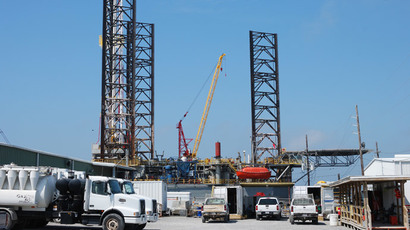New oil era in US? Washington mulls lifting 41-yr export ban
The US government is considering doing away with a four-decade-old law that bans the sale and export of American oil abroad. The decision follows a slew of US-led strategic wars and sanctions in the Middle East that have raised oil prices and demand.
The policy shift comes on the heels of the crisis in Ukraine, as the US may be taking advantage of an opportunity to disrupt Russian oil exports to Europe. The US produces 10 percent of global crude oil supply, but exports precisely zero barrels because of a ban Congress set in reaction to the 1973 Arab Oil Embargo.
Washington is seriously considering changing federal laws to let oil flow abroad, according to US Energy Department Secretary Ernest Moniz.
“The issue of crude oil exports is under consideration…A driver for this consideration is that the nature of the oil we're producing may not be well matched to our current refinery capacity," Moniz said on Tuesday at the end of an energy conference in Seoul, as reported by the Wall Street Journal.
Many Democrats in Congress oppose the idea, as lawmakers believe newfound oil wealth should be kept inside the US to keep domestic energy prices low.
The idea is being floated because of a tremendous supply surplus, resulting resulted from hydraulic-fracturing technology, also known as fracking, which has increased the country’s oil and gas production capacity. The International Energy Agency predicts the US will become the world’s largest oil producer by 2020, and could be energy-independent by 2037.
However, the US is still a net importer of gas, and in 2013, imported 1.3 cubic feet for domestic consumption.
The US has used war and revolutions as a tool to crush their oil producing competition, leaving oil exporting countries like Iraq, Venezuela, Iran and Libya in a disadvantageous position when it comes to developing their oil industry potential.
“The rise in US oil and energy production is made possible by major investment in fracking, and that is made possible by the high price of oil obtained since the US invaded Iraq and destroyed its state-owned oil industry,” William Dores, a political analyst at the New-York based International Action Center, told RT.
“War in the Middle East, whether it’s the destruction of Iraq, the bombing of Libya, the sanctions on Iran… have served to keep prices high and restrict production, which has given the US a big edge,” Dores said.
Six of the top ten nations in terms of proven oil reserves cannot export their oil in full, because of sanctions or intervention by the US.
“The war in Iraq is the best thing that ever happened for ExxonMobil and Chevron and the biggest US oil producers. It took 10 percent of the world’s oil supply off the market; that’s what the sanctions in Iran are about,” said Dores.
It took Iraq years to recover from the blow delivered by the sanctions, the US invasion and the subsequent civil war. It is now the second largest OPEC producer, having surpassed Iran.
Iraq’s output only began to rise four years ago after partnering with big oil companies such as BP, ExxonMobil, and Eni, which are looking to profit despite security challenges.
“These countries are not getting any benefit from this oil, it’s not like anyone is investing in roads or electricity or anything else,” Lawrence Freeman of the Executive Intelligence Review Magazine told RT.
Libya’s oil production plummeted from 1.4 million barrels a day in 2011 to 150,000 barrels a day in March.
Libya has the largest proven oil reserves in Africa, but conflict has derailed its oil production capabilities. Major international energy companies operating there hope production will pick up.
Syria’s oil production is in shambles due to civil war; in the last three years it has gone down from 400,000 barrels to 25,000 barrels per diem.
“I think the political and economic destruction of these countries goes together with an increase of control by these oil companies,” said Freeman.
The US currently imports its oil from Canada, Saudi Arabia, Mexico, Venezuela, and Iraq, as well as Nigeria and other South American countries.
In April, crude oil production in America averaged 8.3 million barrels a month and imports averaged 9.6 million barrels. Crude oil imports averaged 15.9 million barrels a month as of May 2.
The US Energy Information Administration predicts that the spot price of Brent crude oil will decline throughout 2014, dropping from the current barrel price of $108 to $103 by the fourth quarter.














